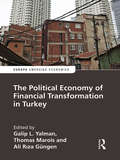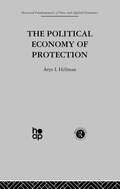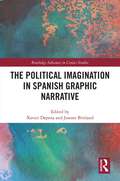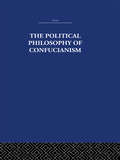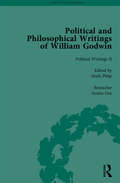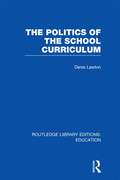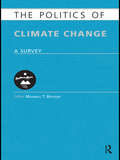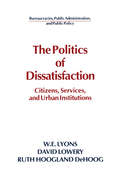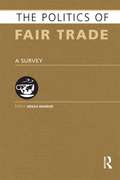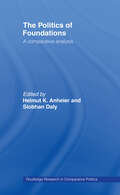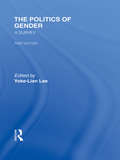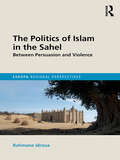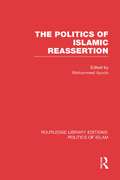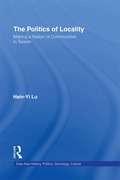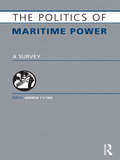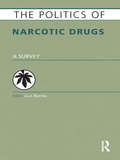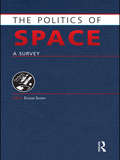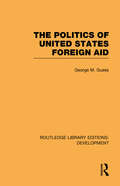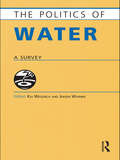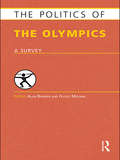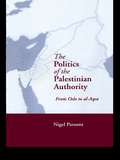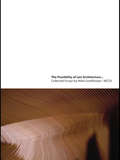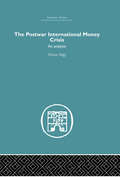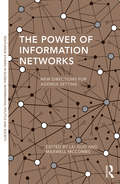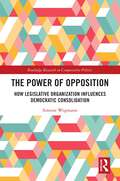- Table View
- List View
The Political Economy of Financial Transformation in Turkey (Europa Perspectives: Emerging Economies)
by Galip Yalman Thomas Marois Ali Rıza GüngenThis volume provides a comprehensive study of Turkey’s financial transformation into one of the most dynamic, if not trouble-free, emerging capitalisms. While this financial evolution has underwritten Turkey’s dramatic economic growth, it has done so without ameliorating the persistently exploitative and unequal social structures that characterize neoliberalism today. This edited volume, written by an interdisciplinary range of political economists, critically examines Turkey’s financial transformation, contributing to debates on the nature of peripheral financialization. Eschewing economistic interpretations, The Political Economy of Financial Transformation in Turkey underscores both the quantitative significance of exponential growth in financial flows and investments, and the qualitative importance of the state’s institutional restructuring around financial imperatives. The book presents today’s reality as historically rooted. By understanding the choices made under the new Republic (from 1923 onwards), one can better locate the changes launched as a newly liberalizing society (since 1980). Likewise, the decisions made in response to Turkey’s 2001 financial crisis spurred a tectonic break in state–market–society financial relations. The waves of change have reached far and wide: from corporate strategies of accumulation and growth to small- and medium-sized enterprises’ strategies of financial survival; from how finance has penetrated the provisioning of housing to how households have become financialized. Put together, one grasps the complexity and historicity of the power of contemporary finance. One also sees that the changes made have not been class-neutral, but have entailed elevating the interests of major capital groups, particularly financial capital, above the interests of the poor and workers in Turkey. Nor are these changes constrained to its national borders, as what transpires domestically contributes to the making of a financialized world market. Through this ‘Made in Turkey’ approach the contributions in this volume thus challenge dominant understandings of financialization, which are derived from the advanced capitalisms, by sharing the specificity of emerging capitalisms such as Turkey.
The Political Economy of Protection (Harwood Fundamentals Of Pure And Applied Economics Ser.)
by Arye L. HillmanFirst Published in 2001. Routledge is an imprint of Taylor & Francis, an informa company.
The Political Imagination in Spanish Graphic Narrative (Routledge Advances in Comics Studies)
by Xavier Dapena Joanne BritlandIn a spirit of community and collective action, this volume offers insights into the complexity of the political imagination and its cultural scope within Spanish graphic narrative through the lens of global political and social movements. Developed during the critical years of the COVID-19 pandemic and global lockdown, the volume and its chapters reflect the interdisciplinary nature of the comic. They employ a cultural studies approach with different theoretical frameworks ranging from debates within comics studies, film and media theory, postcolonialism, feminism, economics, multimodality, aging, aesthetics, memory studies, food studies, and sound studies, among others. Scholars and students working in these areas will find the book to be an insightful and impactful resource.
The Political Philosophy of Confucianism: An interpretation of the social and political ideas of Confucius, his forerunners, and his early disciples.
by Leonard Shihlien HsüFirst published in 1932.One of the most astonishing features of the Confucian teaching to the modern reader is its anticipation of the Spencerian formula of evolution and its adaptation of this to a programme of progress. This volume shows that Confucius' teaching is still relevant in many of its features, not merely for China but also for the West. Contents include: The background of Confucian political philosophy; the state and its origin; political unity and organization; the principle of benevolent government; law and justice; democracy and representation, social evolution.
The Political and Philosophical Writings of William Godwin vol 2
by Martin Fitzpatrick Mark Philp Pamela Clemit William St.ClairContains all the major political, philosophical and educational writings of William Godwin, one of the foremost philosophers of his age. His work on government and individual freedom, "Political Justice", made him the chief exponent of English radicalism in the latter half of the 18th century.
The Politics of the School Curriculum (Routledge Library Editions: Education)
by Denis LawtonIf the curriculum can be defined as a ‘selection from the culture of society’, the central question then becomes ‘who selects’. This volume answers this question, reviewing various aspects of the curriculum and its planning. For many years the control of the curriculum was uncontroversial. In the 1970s this situation changed: teachers were increasingly criticised for having too much power; the Department of Education was suspected of wanting more control and local education authorities felt they should be more involved in curriculum planning. In reviewing some of the reasons for these conflicting pressures, two central themes emerge: first, the change from a partnership model of control to a complex system of accountability; and second the fact that these and many other changes which occur tend to be brought about as a result of secret decisions and central manipulation rather than through open negotiation. Among the areas covered are the changing position of teachers and the Department of Education, the influence of examinations on the curriculum, and some political aspects of curriculum evaluation and the different models used.
The Politics of Climate Change: A Survey
by Maxwell T. BoykoffClimate change is a defining issue in contemporary life. Since the Industrial Revolution, heavy reliance on carbon-based sources for energy in industry and society has contributed to substantial changes in the climate, indicated by increases in temperature and sea level rise. In the last three decades, concerns regarding human contributions to climate change have moved from obscure scientific inquiries to the fore of science, politics, policy and practices at many levels. From local adaptation strategies to international treaty negotiation, ‘the politics of climate change’ is as pervasive, vital and contested as it has ever been. On the cusp of a new commitment to international co-operation to rein in greenhouse gas emissions, this essential book intervenes to help understand and engage with the dynamic and compelling ‘Politics of Climate Change’. This edited collection draws on a vast array of experience, expertise and perspectives, with authors with backgrounds in climate science, geography, environmental studies, biology, sociology, political science, psychology and philosophy. This reflects the contemporary conditions where the politics of climate change permeates and penetrates all facets of our shared lives and livelihoods. Chapters include the Politics of Climate Science, History of Climate Policy, the Cultural Politics of Climate Change: Interactions in the Spaces of Everyday, the Politics of Interstate Climate Negotiations, the Politics of the Carbon Economy, and Addressing Inequality. An A – Z glossary of key terms offers additional information in dictionary format, with entries on topics including Carbon tax, Stabilization, Renewable technologies and the World Meteorological Organization. A section of Maps offers a visual overview of the effects of environmental change.
The Politics of Dissatisfaction: Citizens, Services and Urban Institutions (Bureaucracies, Public Administration, And Public Policy Ser.)
by David Lowery William E. Lyons Ruth Hoogland DeHoogThe Politics of Dissatisfaction: Citizens, Services, and Urban Institutions is destined to be a classic in public administration and public policy; it makes major theoretical and empirical contributions to the literature in both fields. It is a rigorous empirical attempt to assess the public choice view of citizenship and local government. The research upon which this book is based was founded on conversations between two of its authors, W. E. Lyons and David Lowery, during the early 1980s.
The Politics of Fair Trade: A Survey
by Meera WarrierThe Politics of Fair Trade is a brand new title that explores the current issues in fair trade, featuring in-depth analysis by the leading experts in this field. Edited by Meera Warrier, this exciting title boasts case studies of the key commodities involved in fair trade issues, plus an A-Z of entries dealing with issues, organizations, disputes, and relevant countries with regard to fair trade.
The Politics of Foundations: A Comparative Analysis (Routledge Research in Comparative Politics)
by Helmut Anheier Siobhan DalyThis book explores the roles and visions foundations have of, and for, themselves in the new Europe. The leading contributors go beyond a quantitative profile of foundations in Europe, and probe deeper into their role and contributions in meeting the economic, cultural, environmental and educational needs of European societies. Includes a mapping and appraisal of foundation visions, policies and strategies, and an overall assessment of the current and future policy environment in which they operate. The Politics of Foundations combines the detailed comparative analysis of current challenges facing foundations, with individual country studies on Austria, Belgium, Czech Republic, Denmark, Estonia, France, Germany, Greece, Hungary, Ireland, Italy, the Netherlands, Norway, Poland, Spain, Sweden, Switzerland and the United Kingdom and also includes a comparative view from the United States. This valuable reference will be of interest to researchers and students of foundations, policy-making, comparative politics and international business, as well as policy makers and professionals.
The Politics of Gender: A Survey
by Yoke-Lian LeeThis new title in the Politics of . . . series addresses the major theme of the politics of gender. Chapters on a variety of issues, contributed by experts in the field of gender, include Human Trafficking and EU Law, Gender in International Relations, the Gender Politics of Philosphy/Political Theory, the Construction of Masculinity in Hollywood Movies, the Politics of Law, and the Politics of Mainstreaming Gender in the Peace and Security Agenda of the African Union. An A–Z glossary offers supplementary information on key terms, with entries including abortion, Commission on the Status of Women, ecofeminism, equal access, human rights, migration, population control, and sex tourism.
The Politics of Islam in the Sahel: Between Persuasion and Violence (Europa Regional Perspectives)
by Rahmane Idrissa‘Ideologies need enemies to thrive, religion does not’. Using the Sahel as a source of five comparative case studies, this volume aims to engage in the painstaking task of disentangling Islam from the political ideologies that have issued from its theologies to fight for governmental power and the transformation of society. While these ideologies tap into sources of religious legitimacy, the author shows that they are fundamentally secular or temporal enterprises, defined by confrontation with other political ideologies–both progressive and liberal–within the arena of nation states. Their objectives are the same as these other ideologies, i.e., to harness political power for changing national societies, and they resort to various methods of persuasion, until they break down into violence. The two driving questions of the book are, whence come these ideologies, and why do they–sometimes–result in violence? Ideologies of Salafi radicalism are at work in the five countries of the Sahel region, Burkina Faso, Mali, Niger, (Northern) Nigeria and Senegal, but violence has broken out only in Mali and Northern Nigeria. Using a theoretical framework of ideological development and methods of historical analysis, Idrissa traces the emergence of Salafi radicalism in each of these countries as a spark ignited by the shock between concurrent processes of Islamization and colonization in the 1940s. However, while the spark eventually ignited a blaze in Mali and Nigeria, it has only led to milder political heat in Niger and Senegal and has had no burning effect at all in Burkina Faso. By meticulously examining the development of Salafi radicalism ideologies over time in connection with developments in national politics in each of the countries, Idrissa arrives at compelling conclusions about these divergent outcomes. Given the many similarities between the countries studied, these divergences show, in particular, that history, the behaviour of state leaders and national sociologies matter–against assumptions of ‘natural’ contradictions between religion (Islam) and secularism or democracy. This volume offers a new perspective in discussions on ideology, which remains–as is shown here–the independent variable of many key contemporary political processes, either hidden in plain sight or disguised in a religious garb.
The Politics of Islamic Reassertion (Routledge Library Editions: Politics of Islam)
by Mohammed AyoobThe Iranian Revolution has catalysed the preconceptions holding sway in the Western World about the character of Islam and its politics, based as they are on a mixture of imagined cultural superiority and a latent fear of a resurgence similar to the Arab conquests of the seventh and eighth centuries of the long Ottoman domination of Eastern Europe. This book constitutes a counterweight to such monolithic perceptions of Islam. It surveys the nature of opinion and of government in the larger Muslim regions of the world, and the position of Muslims in states where they are not the dominant population. Each contributor expresses his own assessment of the regional data, and the editor’s concluding chapter draws together the threads of a work which will form an important contribution to international understanding and a first breach in the ‘Green Curtain’ dividing East and West. First published in 1981.
The Politics of Locality: Making a Nation of Communities in Taiwan (East Asia: History, Politics, Sociology And Culture Ser.)
by Hsin-Yi LuFirst published in 2002. Routledge is an imprint of Taylor & Francis, an informa company.
The Politics of Maritime Power: A Survey
by Andrew T H TanSince the crucial maritime battles that were fought during the Second World War in both the Atlantic and Pacific Oceans and the post-war period, which saw a naval standoff between a vast US navy and a growing Soviet navy, the focus of international maritime power has changed. Major maritime powers have deployed warships, aircraft carriers and heavy land forces around the globe, for purposes of diplomacy, such as in maintaining far-flung alliances; for deterrent purposes, such as in the Taiwan Straits; for warfighting, such as in its crucial support roles in recent conflicts in Afghanistan and both Gulf Wars; and for complex emergencies, such as tsunami and earthquake rescue in Indonesia and Pakistan. Increasingly, maritime power is employed in counter-terrorism, such as in joint patrols, counter-terrorism exercises and in intercepting ships suspected of carrying weapons of mass destruction. The Politics of Maritime Power is an exploration of the contemporary facets of maritime power, particularly as an instrument of the state, in the post-Second World War era. This reference volume is divided into four parts, with chapters exploring various aspects of modern maritime power written by maritime experts; a series of maps which show major maritime zones; a glossary which contains over 240 entries on various aspects of maritime power; and a detailed bibliography.
The Politics of Narcotic Drugs: A Survey
by Julia BuxtonThe Politics of Narcotic Drugs brings together leading experts on the drugs trade to provide an accessible yet detailed analysis of the multiple challenges that the contemporary trade in narcotic drugs and its prohibition pose, from the local to the international community. Through the use of country and regional case studies that include Afghanistan, Mexico, Colombia and the Middle East, the drivers of the drugs trade and the security and development dilemmas created by the prohibition of narcotic substances are explored. Contributions that assess the international drug control regime, British anti-drug enforcement organizations, 'narcoterrorism' and options for drug policy reform engage readers in current debates and the narrative frameworks that shape discussion of the drugs issue. The book is an invaluable guide to the dynamic and far-reaching issue of narcotic drugs and the impact of their prohibition on our countries and communities. The chapters are followed by an A-Z glossary of key terms, issues and organizations, and a section of maps and statistics.
The Politics of Space: A Survey
by Eligar SadehThe pace of space exploration has long been dictated by political motivations. This book helps to explain why this is so in the post-Cold War era. Combining essays, a glossary of terms, tables and statistics, this new title from Routledge comes as a welcome addition to this increasingly popular topic. The book: covers theories and concepts, as well as current issues gives a background to international and national space agencies contains essays that cover military, commercial and governmental actors in space politics.
The Politics of United States Foreign Aid (Routledge Library Editions: Development)
by George M. GuessFirst published in 1987, this reissue explores contemporary United States foreign aid policies and thinking in the Reagan era. The author argues that aid policy is often confused as a result of bureaucratic decision-making processes. The book contrasts the experience of the many countries where aid-giving has produced unwished-for effects with the few countries where the desired results have occurred. The author concludes by arguing for a new approach to aid-giving by the United States.
The Politics of Water: A Survey
by Kai WegerichThis authoritative reference work gives timely information on the global politics of water. Readers will find case studies on a variety of complex water situations, from the Okavango River that flows through Angola, Namibia and Botswana, to the Euphrates-Tigris of the Upper Persian Gulf. With the current threat of climate change and increasing demand on water resources, the book gives valuable insight into an increasingly politicized topic. Politics of Water is a welcome addition to Routledge’s extensive The Politics of … reference series. Readers will benefit from: essays on major topics in water politics from a variety of contributors (thirteen in all), including Is water politics? Towards international water relations and The politics of water and mining in South Africa sensitive debate on gender issues, reflecting the fact that in many cultures men are responsible for the supply of water, and women as cultivators and house keepers are the major users an A-Z glossary of key terms, issues, organizations, etc. in water politics information on selected major river basins of the world, including maps detailing water consumption and resources. The Politics of Water is a useful guide to the politics surrounding the availability and provision of water on a world-wide scale. It will prove to be a useful reference source for anyone interested in, or studying, the politics of water and climate change.
The Politics of the Olympics: A Survey
by Alan BairnerWith the ever increasing global significance of the Olympic Games, it has never been more topical to address the political issues that surround, influence and emanate from this quadrennial sporting mega event. In terms of the most recent evidence of the politics of the Olympics, the 2008 Beijing Games were riddled with political messages and content from the outset, and provided a global stage for protesters with numerous agendas. These included, to name but a few, proposed boycotts, potential terrorist attacks, the question of open media access, protests against China’s political practices and attempts to interrupt the ‘traditional’ torch rally. Essays in this collection focus on numerous political aspects of the Olympics from a variety of different perspectives, with a Glossary that contains a range of politically relevant entries relating to famous and infamous Olympic athletes, Olympic movement personnel and events and broader political issues and developments which have affected the modern Games. The purpose of this anthology is not to perpetuate hatred towards the concept and practices of Olympism or to regurgitate a ‘celebratory party line’. Instead, in addition to being informative, the book offers critical engagement with the Olympics by raising awareness of the movement’s political significance. Consequently, the essays in this anthology illustrate the strong but changing links between the modern Olympic Games and politics, in general, and address and discuss the key political aspects and issues with regard to the Games themselves, to national and international sport organisations and to specific countries’ attitudes to (ab)using the idea/ideal of the Olympics for their own political ends.
The Politics of the Palestinian Authority: From Oslo to Al-Aqsa
by Nigel ParsonsThis book explores the development of the Palestinian Liberation Organization (PLO) from a liberation movement to a national authority, the Palestinian National Authority (PNA). Based on intensive fieldwork in the West Bank, Gaza and Cairo, Nigel Parsons analyzes Palestinian internal politics and their institutional-building by looking at the development of the PLO. Drawing on interviews with leading figures in the PLO and the Palestinian Authority, delegates to the negotiations with Israel, and the Palestinian political opposition, it is a timely account of the Israel/Palestine conflict from a Palestinian political perspective.
The Possibility of (an) Architecture: Collected Essays by Mark Goulthorpe, dECOi Architects
by Mark GoulthorpeArticulating a radical agenda for the rethinking of the basic precepts of the construction industry in light of digital technologies, this book explores the profound shift that is underway in all aspects of architectural process. Essays and lectures from the last fifteen years discuss these changes in relation to dECOi Architects, created in 1991 as a forward-looking architectural practice. This excellent collection is relevant to architectural professionals, academics and students and also to practitioners in many related creative fields who are similarly engaged in trying to comprehend the significance of the import of digital media.
The Postwar International Money Crisis: An Analysis
by Victor ArgyFirst Published in 2005. The book has two principal aims. First, to provide a description of the major international monetary developments in the industrial world in the post-war years. Second, to evaluate and analyse these developments by reference to a theoretical framework and, in addition, to look at the key policy issues in the context of the new environment of the last decade.
The Power of Information Networks: New Directions for Agenda Setting (Routledge Studies in Global Information, Politics and Society)
by Lei Guo Maxwell McCombsThe news media have significant influence on the formation of public opinion. Called the agenda-setting role of the media, this influence occurs at three levels. Focusing public attention on a select few issues or other topics at any moment is level one. Emphasizing specific attributes of those issues or topics is level two. The Power of Information Networks: The Third Level of Agenda Setting introduces the newest perspective on this influence. While levels one and two are concerned with the salience of discrete individual elements, the third level offers a more comprehensive and nuanced perspective to explain media effects in this evolving media landscape: the ability of the news media to determine how the public associates the various elements in these media messages to create an integrated picture of public affairs. This is the first book to detail the theoretical foundations, methodological approaches, and international empirical evidence for this new perspective. Cutting-edge communication analytics such as network analysis, Big Data and data visualization techniques are used to examine these third-level effects. Diverse applications of the theory are documented in political communication, public relations, health communication, and social media research. The Power of Information Networks will interest scholars, students and practitioners concerned with the media and their social and cultural effects.
The Power of Opposition: How Legislative Organization Influences Democratic Consolidation (Routledge Research in Comparative Politics)
by Simone WegmannProposing a novel way to look at the consolidation of democratic regimes, this book presents important theoretical and empirical contributions to the study of democratic consolidation, legislative organization, and public opinion. Theoretically, Simone Wegmann brings legislatures into focus as the main body representing both winners and losers of democratic elections. Empirically, Wegmann shows that the degree of policy-making power of opposition players varies considerably between countries. Using survey data from the CSES, the ESS, and the LAPOP and systematically analyzing more than 50 legislatures across the world and the specific rights they grant to opposition players during the policy-making process, Wegmann demonstrates that neglecting the curial role of the legislature in a democratic setting can only lead to an incomplete assessment of the importance of institutions for democratic consolidation. The Power of Opposition will be of great interest to scholars of comparative politics, especially those working on questions related to legislative organization, democratic consolidation, and/or public opinion.
